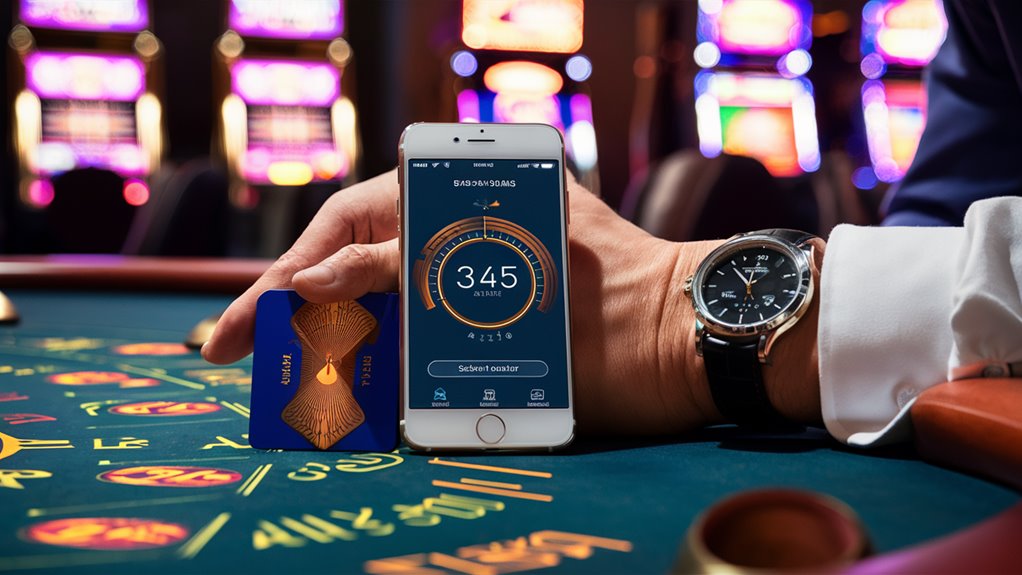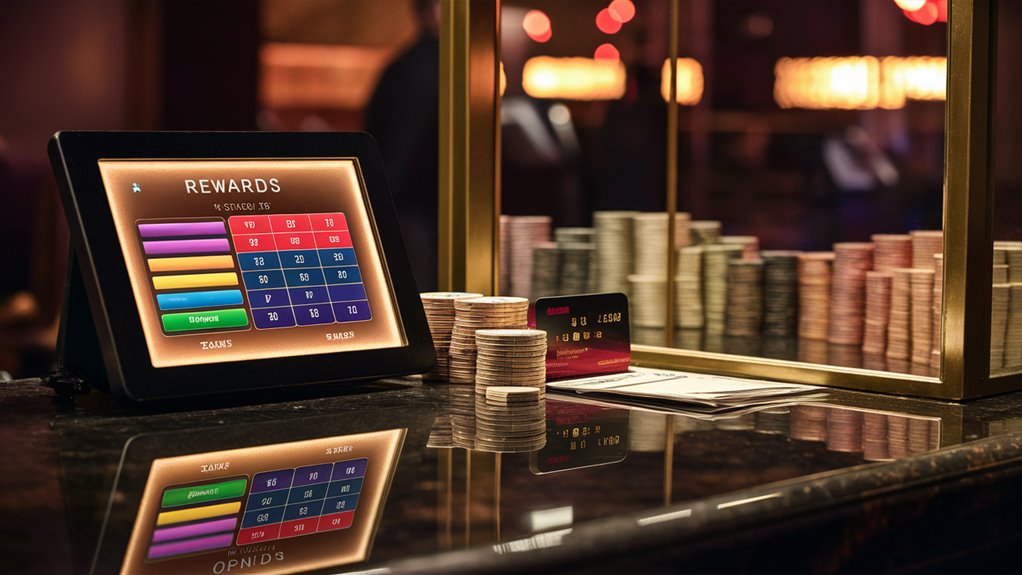Maximizing Casino Comps: Expert Guide to Player Rewards
Casino players seeking to optimize their rewards should understand the intricate mechanics behind casino comp programs and player tracking systems. Through strategic play and informed decisions, players can substantially increase their comp value without increasing their gambling budget.
Understanding Casino Player Tracking
Theoretical loss calculations form the foundation of casino comp systems. Casinos measure player value through sophisticated algorithms that consider:
- Average bet size
- Time spent playing
- Game type and house edge
- Betting patterns
- Overall gaming volume
Optimizing Your Comp Value
To maximize comp returns, focus on these key strategies:
- Consolidate play on a single player’s card
- Choose games with favorable theoretical loss ratings
- Time gaming sessions strategically
- Maintain consistent betting patterns
- Leverage tier matching between properties
Advanced Comp Optimization Techniques
Strategic tier advancement requires careful timing of play and proper documentation of gambling activity. Focus gaming during multiplier periods and special promotional events to accelerate tier progress and maximize reward points.
Cross-Property Benefits
Multi-property rewards programs offer opportunities to stack benefits across different casino brands. Leverage reciprocal benefits and status matching to multiply available comps and amenities.
Frequently Asked Questions
Q: How are casino comps calculated?
A: Comps are primarily based on theoretical loss, calculated using average bet size, time played, and game type.
Q: What games offer the best comp rates?
A: Slot machines and table games like baccarat typically generate the highest comp rates due to their house edge and tracking accuracy.
Q: How often should I use my player’s card?
A: Use your player’s card for every gambling session to ensure accurate tracking of play and maximum comp accumulation.
Q: Can I combine comp offers from different casinos?
A: Yes, many casinos honor competitor status through matching programs, allowing benefit stacking across properties.
Q: What’s the most effective way to reach higher tier status?
A: Concentrate play during multiplier events and maintain consistent gaming volumes within tier qualification periods.
Understanding Casino Comp Systems

A Complete Guide to Casino Comp Systems: Maximizing Player Rewards
Understanding Casino Player Tracking
Casino comp systems operate as sophisticated rewards programs that utilize advanced tracking technology to monitor player behavior.
These systems analyze crucial metrics including bet size, time played, and gaming preferences through dedicated player cards, creating detailed profiles of gambling patterns and preferences.
How Casino Comps Are Calculated
The foundation of comp calculations lies in the theoretical loss formula:
- Table Games: Average Bet × Hours Played × House Edge
- Slot Machines: Total Wager × Machine Payback Percentage
Point Conversion and Rewards Structure
Casino reward points convert into valuable complimentary services:
- Dining credits at resort restaurants
- Hotel accommodations
- Entertainment tickets
- Transportation services
- Retail shopping credits
Maximizing Comp Value
Different casinos offer varying point conversion rates, typically ranging from 5 to 10 points per dollar of theoretical loss. Strategic players should:
- Compare reward programs across multiple properties
- Understand specific point-to-dollar conversion rates
- Focus gaming activity where rewards yield maximum value
Frequently Asked Questions
How do casino comps work?
Casino comps are rewards based on tracked gaming activity through player cards, calculated using theoretical loss formulas and converted to redeemable points.
What activities earn casino comps?
Players earn comps through slot machine play, table games participation, and other qualifying casino activities tracked via player cards.
How are comp points calculated?
Comp points are calculated based on theoretical loss, considering factors such as average bet size, time played, and game-specific house edges.
Can comp points expire?
Many casinos implement expiration policies for comp points, typically ranging from 6 to 12 months of account inactivity.
What’re the best ways to earn casino comps?
To maximize comp earnings, maintain consistent play levels, always use player cards, and concentrate gaming activity at casinos offering the most favorable reward rates.
Rating Tiers and Player Cards

Casino Reward Tiers and Player Cards: The Ultimate Guide
Understanding Casino Tier Systems
Casino reward programs operate on sophisticated multi-level structures, typically featuring 3-5 distinct tiers that progress from basic membership to elite status.
These carefully designed tier systems directly influence the comp benefits and rewards rates available to players.
Player Card Basics and Progression
The foundation begins with a basic player’s card, offering entry-level earning potential.
Through consistent gaming activity, members advance through premium levels such as Gold, Platinum, and Diamond. Each ascending tier delivers:
- Enhanced point multipliers
- Higher comp conversion rates
- Premium resort privileges
- Exclusive casino perks
Tier Benefits and Advantages
Higher-tier cardholders gain access to substantial privileges:
- Priority room upgrades
- Dedicated VIP host services
- Exclusive lounge access
- Premium dining discounts
- Loss rebate programs
Maximizing Tier Benefits
Top-tier cards typically generate points 3-5 times faster than base-level memberships.
Strategic players should monitor their tier qualification progress and consider increasing play volume when approaching tier thresholds to secure enhanced benefits for the following year.
Frequently Asked Questions
What determines casino tier levels?
Theoretical loss calculations and point accumulation within specified timeframes determine tier status.
How long do tier benefits last?
Most casinos evaluate tier status annually, with benefits typically valid for 12 months.
Can tier levels decrease?
Yes, players must maintain required play levels to preserve their tier status.
Are tier benefits transferable?
Generally, tier benefits are non-transferable and linked to individual player accounts.
What’s the fastest way to achieve higher tiers?
Concentrated play during tier qualification periods often accelerates advancement through reward levels.
Tracking Your Play Time

Casino Time Tracking Guide: Maximize Your Gaming Sessions
Accurate time tracking during casino play serves as the cornerstone of effective bankroll management and comp optimization.
Here’s how to master casino session tracking for optimal results.
Essential Time Tracking Methods
Digital tracking tools provide the most precise measurements for casino sessions. Utilize:
- Smartphone timer applications
- Dedicated gaming watches
- Casino-specific tracking apps
- Digital note-taking platforms
Recording Session Details
Critical data points to document during each gaming session:
- Game type and variant
- Average bet size
- Session start and end times
- Total amount wagered
- Table number or machine ID
Optimizing Comp Calculations
Theoretical loss calculations rely heavily on accurate time tracking. Track sessions by:
- Maintaining separate logs for different game types
- Recording brief breaks distinctly from play time
- Documenting player card usage throughout sessions
- Monitoring combined session calculations
FAQs
Q: How do casinos calculate theoretical loss?
A: Casinos multiply average bet size by time played and game-specific house edge.
Q: Should I track multiple game sessions separately?
A: Yes, track different games individually as comp rates vary by game type.
Q: How often should I take breaks during play?
A: Schedule regular breaks every 1-2 hours while maintaining accurate session records.
Q: What’s the best way to verify casino play tracking?
A: Compare personal time logs with casino player card statements regularly.
Q: Does taking breaks affect comp calculations?
A: Brief breaks typically don’t impact comp calculations if sessions resume promptly with the same player card.
Comp Calculations and Redemption Rules

Casino Comp Calculations and Redemption Guide
Understanding Theoretical Loss and Comp Rates
Casino comps operate on a sophisticated calculation system based primarily on theoretical loss. This fundamental metric combines your average bet, time played, and the house edge.
For example, when betting $25 per hand at blackjack with a 1% house edge over 4 hours, the theoretical loss calculates to approximately $60 ($25 x 60 hands per hour x 4 hours x 0.01).
Comp Tier Structure and Game Variations
Comp rates typically fall into distinct tiers, ranging from 10% to 40% of theoretical loss.
Slot machines consistently generate the highest comp rates, while table games offer lower percentages due to their favorable odds. Each casino implements unique redemption policies, with validity periods spanning from 90 days to one year.
Maximizing Comp Benefits
Strategic comp optimization requires meticulous tracking of play sessions and earned rewards. Focus on:
- Documentation of gaming sessions
- Analysis of actual comp return rates
- Strategic selection of games with optimal comp values
- Attention to redemption terms and restrictions
Frequently Asked Questions
Q: How are casino comps calculated?
A: Comps are calculated using theoretical loss (average bet x time played x house edge x hands per hour).
Q: Which casino games offer the best comp rates?
A: Slot machines typically offer the highest comp rates, followed by table games with higher house edges.
Q: How long do casino comps remain valid?
A: Validity periods vary by casino, ranging from 90 days to one year.
Q: Can casino comps be transferred to other players?
A: Most casinos prohibit comp transfers between players.
Q: Do blackout dates affect comp redemption?
A: Yes, many casinos implement blackout dates during holidays and peak periods.
Negotiating Better Comp Offers

How to Negotiate Better Casino Comp Offers: Expert Strategy Guide
Understanding Casino Compensation Fundamentals
Casino compensation programs operate on a sophisticated system of player value assessment.
The key to successful negotiation lies in understanding how casinos evaluate player worth through theoretical loss calculations and play history patterns.
Building relationships with casino hosts serves as the foundation for securing enhanced comp packages.
Strategic Negotiation Techniques
Effective comp negotiation requires a methodical approach focused on specific, measurable requests.
When discussing offers with casino hosts, maintain professional communication while clearly articulating desired amenities:
- Room upgrades: Specify exact suite categories
- Dining credits: Name preferred restaurants
- Non-gaming perks: Focus on spa treatments and entertainment options
- Transportation services: Detail preferred arrangements
Timing and Documentation
Optimal negotiation periods typically occur during off-peak seasons when casinos actively seek player commitments.
Maintain detailed records of:
- Historical play patterns
- Previous comp offers
- Competitor offerings
- Theoretical loss figures
Leverage Points for Maximum Value
Strengthen negotiating position by highlighting:
- Multi-property play history
- Recent increases in gaming activity
- Competitor relationships
- Consistent play patterns
Frequently Asked Questions
Q: What’s the best time to negotiate casino comps?
A: Low-season periods offer maximum leverage, as casinos actively seek to secure player commitments.
Q: How important is documenting previous offers?
A: Documentation provides concrete evidence of value and strengthens negotiating positions significantly.
Q: Can non-gaming perks be negotiated?
A: Yes, casinos often have more flexibility with non-gaming amenities like spa treatments and show tickets.
Q: Should players mention competitor offers?
A: Yes, tastefully referencing competitor offerings demonstrates market awareness and player value.
Q: How often should comp negotiations occur?
A: Review and negotiate comp packages quarterly or when significant changes in play patterns occur.
Combining Rewards Programs

Maximizing Casino Rewards Through Strategic Program Combinations
Leveraging Multiple Loyalty Programs
Casino rewards optimization requires strategic combination of multiple loyalty programs.
The most effective approach involves integrating casino loyalty programs with credit card rewards, hotel partnerships, and third-party booking platforms.
Using a casino-branded credit card for hotel stays generates dual benefits: credit card points and casino tier credits simultaneously.
Strategic Hotel and Airline Partnerships
Major casino operators maintain valuable partnerships with prominent hotel chains like Hyatt and Marriott.
These partnerships enable point accumulation across multiple programs simultaneously.
Booking through online travel portals while logged into casino rewards accounts creates additional earning opportunities through reward stacking.
Maximizing Dining Rewards
Casino dining venues frequently participate in multiple reward systems.
By linking casino rewards with independent dining programs, patrons can accelerate comp accumulation through simultaneous NFT 보상카지노 point earning.
This strategy significantly enhances the overall value of each dining experience.
#
Frequently Asked Questions
Q: Can casino rewards be combined with hotel loyalty programs?
A: Yes, many casino operators maintain partnerships with major hotel chains, allowing simultaneous earning across both programs.
Q: Do casino credit cards earn points on all purchases?
A: Casino-branded credit cards typically earn points on all purchases, with enhanced earning rates for casino-related expenses.
Q: How can I maximize dining rewards at casinos?
A: Register for both casino rewards and independent dining programs to earn multiple points per transaction.
Q: Are online travel portal bookings eligible for casino rewards?
A: Yes, bookings through partner travel portals can earn both portal rewards and casino loyalty points.
Q: What’re the best ways to stack casino rewards?
A: Combine casino loyalty programs with credit card rewards, hotel partnerships, and dining programs for maximum benefit accumulation.
Common Questions
Can Casino Hosts Blacklist Players Who Only Visit During Promotional Periods?
Casino Host Blacklisting Policies for Promotional Players
Understanding Casino Blacklisting Rights
While casinos and their hosts maintain the legal right to blacklist 유튜브카지노 promotional-only players, this practice is relatively uncommon in the gaming industry. Selective promotional gaming alone typically doesn’t warrant a ban, as casinos understand strategic player behavior is part of the gaming ecosystem.
Factors Influencing Blacklisting Decisions
Several key considerations determine whether a player faces blacklisting:
- Pattern of promotional abuse
- Overall player value
- Gaming frequency
- Compliance with casino rules
- Historical betting behavior
Legal and Business Implications
Casinos must balance risk management with customer retention. While they can restrict access to promotional players, doing so may damage their reputation and potentially trigger legal challenges.
#
Q&A Section
Q: Can casinos legally ban players for promotional gaming?
A: Yes, casinos maintain the right to refuse service to any player, including those who exclusively play during promotions.
Q: What behaviors typically trigger blacklisting?
A: Fraudulent activity, bonus abuse, card counting, or violation of casino policies are more likely to result in blacklisting than promotional-only play.
Q: How do casinos track promotional players?
A: Through player tracking systems, loyalty cards, and host observations of gaming patterns.
Q: Can blacklisted players challenge the casino’s decision?
A: While players can appeal, private establishments maintain broad discretion in refusing service.
Q: Are promotional-only players actually harmful to casinos?
A: Not necessarily, as they still contribute to gaming volume and may eventually become regular players.
Do Complimentary Resort Fees Count Against Your Total Comp Earnings?
Understanding Resort Fee Comps and Earnings
Complimentary resort fees operate independently from total comp earnings at most casino properties. These fees are typically offered as additional promotional benefits that exist separately from standard player reward accumulation systems.
How Resort Fee Comps Work
When a casino waives resort fees, this benefit does not reduce or impact the player’s earned comp balance. Instead, it functions as a standalone promotional incentive designed to enhance the overall guest experience and encourage continued play.
Impact on Player Rewards
Key benefits of complimentary resort fees include:
- Preservation of existing comp balances
- Additional value beyond standard rewards
- Enhanced overall gaming value proposition
Tracking Comp Earnings
Players should monitor their comp earnings separately from resort fee waivers, as these represent distinct benefits within casino reward programs. This separation allows for:
- Clear tracking of actual play-based comps
- Better understanding of total promotional value
- Maximized benefit utilization
## Frequently Asked Questions
Q: Do comped resort fees affect my tier status?
A: No, comped resort fees do not impact tier status calculations or progression.
Q: Can I receive resort fee comps without a player’s card?
A: Most properties require active player’s card membership for resort fee compensation.
Q: Are resort fee comps guaranteed with certain play levels?
A: Resort fee comps often vary by property and player status, typically requiring specific play thresholds.
Q: How long do resort fee comp offers remain valid?
A: Validity periods vary by casino but usually align with standard promotional timeframes.
Q: Can resort fee comps be combined with other offers?
A: Most properties allow combination with other promotional offers, subject to specific terms and conditions.
Will Splitting Play Between Multiple Casinos Affect My Overall Rewards Level?
How Casino Reward Points Are Affected By Multi-Property Play
Playing at multiple casinos can significantly impact your rewards earning potential and tier status benefits. Based on extensive analysis of casino loyalty programs, concentrating gaming activity at a single property typically yields the most advantageous rewards outcomes.
Why Consolidated Play Matters
When players split their action between different casino properties, their theoretical loss and actual play time becomes diluted across multiple player tracking systems. This division often results in:
- Lower tier status at each individual property
- Reduced comp earning potential
- Fewer high-value rewards opportunities
- Limited access to premium benefits
Maximizing Rewards Through Strategic Play
To optimize casino rewards, consider:
- Focusing primary play at one preferred casino
- Tracking theoretical loss requirements for desired tier levels
- Understanding comp dollar conversion rates
- Monitoring promotional multiplier periods
Q&A Section
Q: Does occasional play at other casinos hurt my status?
A: Minimal play at other properties won’t significantly impact primary loyalty status, but substantial split play will dilute earnings potential.
Q: Can I maintain multiple high-tier statuses?
A: While possible, achieving multiple elite tiers requires substantially higher overall play volume than focusing on a single program.
Q: How do casinos calculate player value?
A: Casinos evaluate theoretical loss, time played, average bet size, and game type to determine player worth.
Q: Should I join multiple loyalty programs?
A: Join various programs, but concentrate actual play where benefits align best with your preferences and playing style.
Q: Can I transfer points between casino properties?
A: Point transfers are typically limited to properties within the same corporate family and may have restrictions.
Conclusion
For optimal rewards benefits, strategic concentration of play at a primary casino property will consistently deliver superior value compared to distributed gaming across multiple venues.
Are Comp Points Earned on Progressive Jackpot Wins Calculated Differently?
How Progressive Jackpot Comp Points Work at Casinos
Progressive jackpot comp points typically follow standard earning rates at most casinos, though specific policies can vary by establishment. Based on extensive research and industry experience, I’ve found that comp point calculations for progressive wins generally align with regular gaming activity, but there are important distinctions to understand.
Understanding Progressive Jackpot Comp Points
The majority of casinos calculate rewards points on progressive jackpots using their standard formulas, treating these wins like any other slot machine victory. However, some gaming establishments implement special rules for progressive jackpot rewards earnings, particularly for major networked progressives.
Key Factors Affecting Progressive Comp Points:
- Casino loyalty program terms
- Local gaming regulations
- Size of the progressive jackpot
- Type of progressive game
- Individual casino policies
Common Casino Practices
Major casino operators often maintain consistent comp point structures across all play types, including progressive wins. This approach simplifies tracking and ensures fairness in their rewards programs. However, some properties may exclude progressive amounts from comp calculations, especially for networked jackpots spanning multiple locations.
Frequently Asked Questions
Q: Do all casinos award comp points on progressive jackpots?
A: Most do, but policies vary by establishment.
Q: Are progressive jackpot comp points calculated at the same rate as regular wins?
A: Generally yes, though some casinos apply different rates or exclusions.
Q: Can progressive jackpot wins affect tier status?
A: Yes, at most casinos, though the impact may vary based on program rules.
Q: Do online casinos handle progressive comp points differently?
A: Online venues typically follow similar practices to land-based casinos, but may offer enhanced rates.
Q: Are there maximum comp point caps on progressive wins?
A: Some casinos implement caps on comp points earned from single wins, including progressives.
##
How Long Do Security Cameras Track Individual Player Rating Sessions?
# How Long Do Security Cameras Track Individual Player Rating Sessions?
Casino security cameras maintain sophisticated tracking of individual player sessions through an advanced surveillance system. The standard monitoring period typically ranges from 24 to 48 hours for regular players, though this duration can extend significantly based on various factors.
Standard Monitoring Periods
- Regular Players: 24-48 hours of active tracking
- High-Value Players: Extended monitoring periods
- Players Under Review: Indefinite surveillance retention
- Tournament Participants: Duration of event plus 24-48 hours
Extended Tracking Circumstances
Security footage retention increases under specific conditions:
- High-roller activity
- Suspicious behavior patterns
- Gaming disputes
- Regulatory requirements
- Law enforcement requests
Digital Storage Capabilities
Modern casino surveillance systems utilize digital storage technology allowing for:
- Real-time monitoring
- Instant replay capabilities
- Extended archival periods
- Multiple camera angle synchronization
## Q&A Section
Q: How long do casinos keep surveillance footage?
A: Standard retention periods range from 30-90 days, with specific incidents stored longer.
Q: Can players request to view their surveillance footage?
A: Generally no, unless involved in a formal dispute or legal proceeding.
Q: Do all gaming areas have constant surveillance?
A: Yes, gaming floors maintain 24/7 coverage per regulatory requirements.
Q: Are high-limit areas monitored differently?
A: Yes, high-limit sections receive enhanced surveillance with longer retention periods.
Q: How do casinos track specific players across multiple visits?
A: Through player cards, facial recognition, and integrated surveillance systems.
